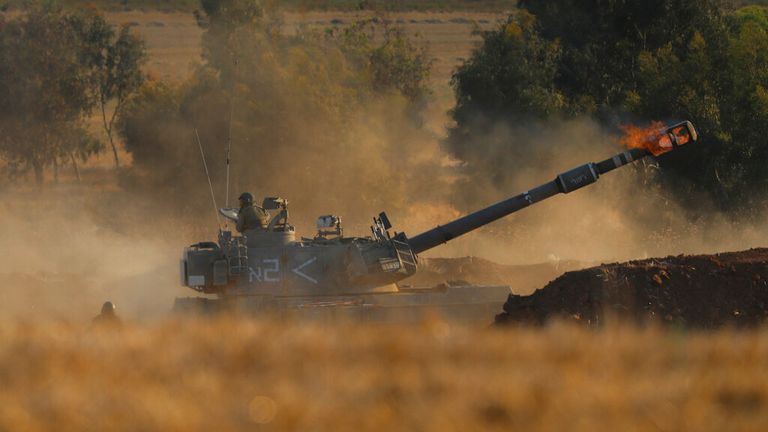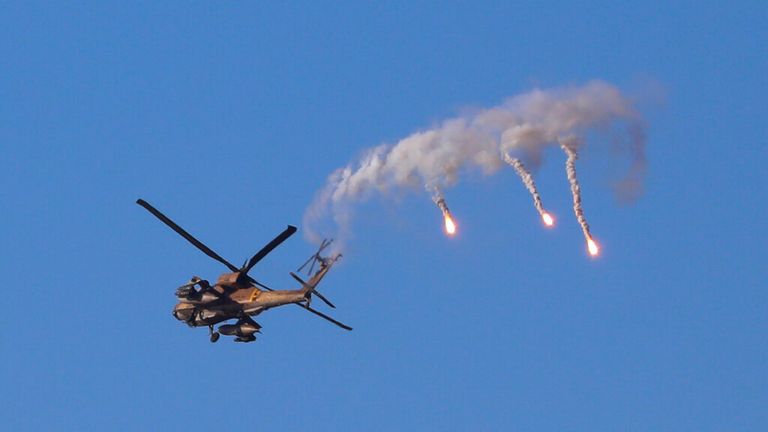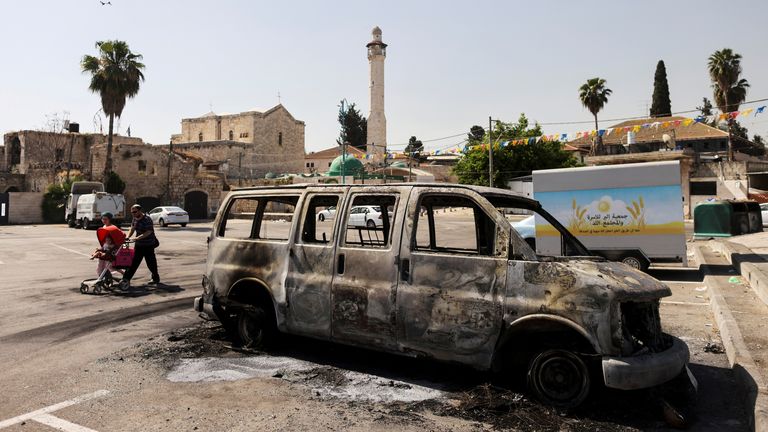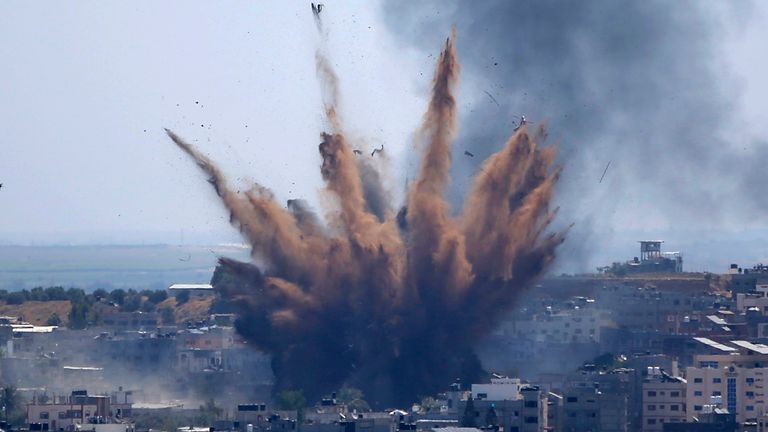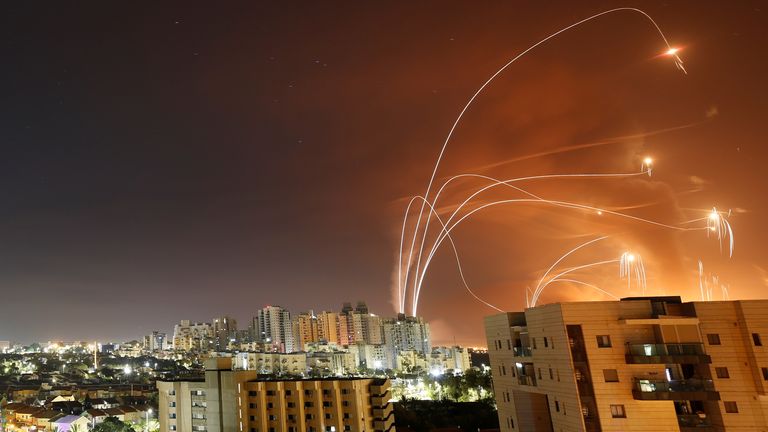Israel has assembled thousands of troops at the Gaza border, as it prepares for a possible ground operation while airstrikes continue on both sides.
The Israeli Defense Forces (IDF) has called up 7,000 reservists, cancelled all weekend leave for combat soldiers and is at “various stages of preparing ground operations”, a spokesperson told The Times of Israel.
Hamas launched hundreds more rockets towards Israel on Thursday, while Israeli Prime Minister Benjamin Netanyahu said his forces had carried out strikes on almost 1,000 targets.
The violence in the region, which began on Monday, is at its worst since the 50-day war of 2014.
Key developments:
• 87 people – including 18 children and eight women – have been killed and 530 injured in Gaza
• Seven people have been confirmed dead in Israel, with more than 200 wounded
• Hamas has acknowledged the death of 13 of its militants, including its Gaza City commander
• Smaller group Islamic Jihad says seven of its militants have been killed
• 1,600 rockets have been fired towards Israel since Monday, with 400 falling short and landing inside Gaza
• Israel says it has hit 600 Hamas targets and destroyed three high-rise buildings in Gaza
• Fears of civil war amid mob fighting between Israeli Jews and Israeli Arabs in “mixed” areas
• Flights to Ben Gurion Airport near Tel Aviv cancelled and redirected
• International community calls for “urgent de-escalation” with Egyptian mediators on the ground and a US envoy on his way
“We will soon pass 1,000 targets,” Mr Netanyahu said on Thursday. “We continue striking Hamas while defending our citizens.
“It will take more time… but we will achieve our goal of bringing back calm to the state of Israel.”
Despite Egyptian negotiators arriving in Gaza and Tel Aviv on Thursday, there was no sign of a ceasefire on either side.
Hamas said it fired its most powerful rocket towards Ramon Airport in southern Israel, after targeting the country’s main air hub – Ben Gurion – and the surrounding area earlier in the week.
Flights are being redirected to Ramon after heavy rocket fire in Tel Aviv and its suburbs on Tuesday and Wednesday.
British Airways, Virgin Atlantic, Lufthansa and Iberia have all cancelled flights to Tel Aviv.
Social media footage, claimed to have been filmed on a flight from Brussels – one of the first to be redirected to Ramon – purported to show rockets being fired and intercepted by Israel’s Iron Dome defence system over the city.
American and other European airlines are avoiding flying to Israel while the fighting continues, with a British Airways spokesman saying: “The safety and security of our colleagues and customers is always our top priority.”
The UN’s fears of “full-scale war” were heightened after a spokesman for Hamas’s military wing threatened to bomb the city of Dimona – the site of Israel’s nuclear reactor.
“The decision to bomb Tel Aviv, Dimona and Jerusalem is easier for us than drinking water,” he said in a video.
Elsewhere, rioting has broken out in “mixed” towns and cities throughout Israel where Arabs and Jews live side-by-side.
Mr Netanyahu told The Times of Israel mob fighting between the two sides risked civil war.
After synagogues were attacked, vehicles were set on fire and violence broke out in the street, he said: “Nothing can justify an Arab mob assaulting Jews, and nothing can justify a Jewish mob assaulting Arabs.”
It comes as Muslims in the region celebrated Eid al-Fitr.
They were urged to keep communal prayers and meals inside mosques and their homes, but many have spilled out on to the streets in protest.
Meanwhile, funeral marches have taken place for those killed in the fighting.
International response
Speaking on Thursday, Prime Minister Boris Johnson said “everybody is very concerned” by the “cycle of violence and reprisals” in Israel.
“I think what everybody wants to see is urgent, urgent de-escalation,” he said.
While he acknowledged Israel’s right to defend itself, US President Joe Biden said the attacks on both sides should end “sooner rather than later” and has sent his most senior envoy to help negotiate.
UN secretary-general Antonio Guterres condemned the “indiscriminate launching of rockets” from civilian areas in Gaza towards Israeli population centres, but he also urged Israel to show “maximum restraint”.
And Egyptian negotiators are holding in-person talks with both sides – Hamas leaders in Gaza and Israeli forces in Tel Aviv – to help end the fighting.
Why did the fighting start?
Since mid-April, there have been clashes on the streets of Jerusalem – a city both Israelis and Palestinians consider to be their capital.
Over the Muslim holy month of Ramadan, which started on 12 April, Israel imposed a limit of 10,000 people gathering for prayers at the al Aqsa mosque.
The mosque is the third most holy site in Islam and is also the site where the Jewish first and second Temples are believed to have been built – known as Temple Mount.
Tens of thousands of Muslims were turned back from the mosque, which was condemned by both moderate Israelis and Palestinians across the board.
Another reason for the increased tension has been the threat of eviction of Palestinian families from the Sheikh Jarrah district.
Jewish settler groups have brought their claim for land and property in the Palestinian neighbourhood, which is based in East Jerusalem, to the Israeli Supreme Court.
On 8 May, the holiest day of Ramadan, tens of thousands of Muslims gathered at the al Aqsa mosque, whose compound borders the Western Wall where Jews pray as it is the closest they can get to the foundations of where the temples once stood.
Israeli police blocked busloads of Muslims from entering the al Aqsa compound, citing unrest in the neighbouring Sheikh Jarrah over the possible court ruling.
On 10 May, Israeli police also used CS gas and stun grenades inside the mosque which drew widespread Palestinian condemnation.
Rockets were fired by Hamas, which rules the Gaza Strip, in what the militant group says was retaliation for Israeli actions in the al Aqsa compound.
Since that day, hundreds of rockets have been fired from Gaza towards Israel, and the Israeli Air Force has carried out airstrikes pounding Gaza.

